| 1 |
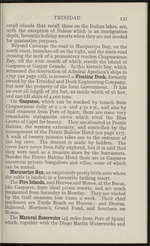 |
“...the destruction of Admiral Apodaca’s ships in
1797 {see page 116), is moored a Floating Dock, formerly
owned by the Trinidad and Dock Engineering Company,
but now the property of the local Government. It has
an overrall length of 365 feet, an inside width of 56 feet,
and can lift ships of 4,000 tons.
» On Gasparee, which can be reached by launch from
'Chaguaramas daily at 9 a.m. and 4.30 p.m., and also by
Gulf steamers from Port of Spain, there are some very
remarkable stalagmitic caves which rival the Blue
Grotto of Capri for beauty. They are situated at Pointe
Baleine, the western extremity, and controlled by the
management of the Pointe Baleine Hotel {see page 117).
A walk of twenty minutes takes one to the entrance of
the big cave. The descent is made by ladders. The
.caves have never been fully explored, but it is said that
they were used as a treasure store by the buccaneers.
Besides the Pointe Baleine Hotel there are in Gasparee
numerous private bungalows and villas, some of which...”
|
|
| 2 |
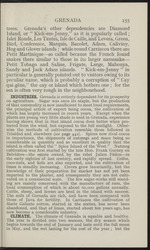 |
“...that commodity is now insufficient to meet local requirements,
I the principal article of export being cocoa, the cultivation of
I which has largely increased in recent years. Except when the
I plants are young very little shade is used in Grenada, experience
I having shown that in that island cocoa does better when pro-
I tected from the wind, but exposed to the full sunlight. Other-
I wise the methods of cultivation resemble those followed in
I Trinidad and elsewhere (see page 442). Spices now rival cocoa
I in importance, the shipments of nutmegs and mace being so
I considerable in quantity and so excellent in quality that the
I island is often called the " Spice Island of the West.” Nutmeg
I - cultivation was first started by the late Hon. Frank Gurney on
I Belvidere—the estate owned by the rebel Julien Fédon—in
I the early eighties of last century, and rapidly spread. Coffee,
I coco-nuts, and kola are also exported, and the cultivation of
I limes is steadily increasing. Cloves grow luxuriantly...”
|
|
| 3 |
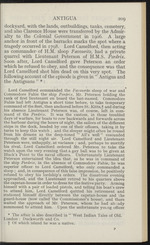 |
“...the Perdrix. It was the custom, in those troubled
days of warfare, for boats to row backwards and forwards across
the harbour during the hours of night, the sailors of the different
ships in the dock, headed by one of their officers, taking it by
turns to keep this watch ; and the sleeper might often be roused
from his dreams as the deep-toned " All’s well ” resounded
through the still night air. Lord Camelford and Lieutenant
Peterson were, unhappily, at variance ; and, perhaps to mortify
his rival, Lord Camelford ordered Mr. Peterson to take the
watch upon the very evening that a gay ball was to be given at
Black’s Point to the naval officers. Unfortunately Lieutenant
Peterson entertained the idea that, as he was in command of
the ship Perdrix, in the absence of Commodore Fahie, he was
superior officer to Lord Camelford, who only commanded a
sloop ; and, in consequence of this false impression, he positively
refused to obey His lordship’s orders. The disastrous evening
approached, and the...”
|
|
| 4 |
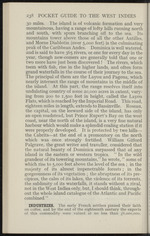 |
“...traveller, considered that [■
the natural beauty of Dominica surpassed that of any '
island in the eastern or western tropics. “ In the wild ;
grandeur of its towering mountains,” he wrote, " some of j
which rise to 5,000 feet above the level of the sea ; in the J s'
majesty of its almost impenetrable forests; in the j
gorgeousness of its vegetation ; the abruptness of its pre- j J
cipices, the calm of its lakes, the violence of its torrents, 1 if
the sublimity of its waterfalls, it stands without a rival, I
not in the West Indies only, but, I should think, through- j ;s
out the whole island catalogue of the Atlantic and Pacific I j
combined ”
1
INDUSTRIES. The early French settlers pinned their faith ) c
on coffee, and by the end of the eighteenth century the exports j U
of this commodity were valued at no less than ^6,000,000. I L
I...”
|
|
| 5 |
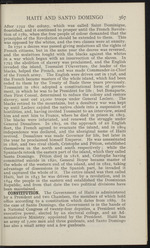 |
“...hostilities, and, having invited Toussaint to an interview, seized
him and sent him to France, where he died in prison in 1803.
The blacks were infuriated, and renewed the struggle under
General Dessalines. In 1803, on the approach of an English
fleet, the French agreed to evacuate the island, and in 1804
independence was declared, and the aboriginal name of Haiti
revived! Dessalines was made Governor for life, but later in
the year he proclaimed himself Emperor. He was assassinated
in 1806, arid two rival chiefs, Cristophe and Pétion, established
themselves in the north and south respectively; while the
Spaniards retook the eastern part of the island, which they called
Santo Domingo. Pétion died in 1818, and, Cristophe having
committed suicide in 1820, General Boyer became master of
the whole of the western end of the island, and in 1822, taking
advantage of dissensions in the Spanish part, he invaded it
and captured the whole of it. The entire island was then called
Haiti, but in 1843 he was driven...”
|
|
